- Home
- H. Rider Haggard
Moon of Israel: A Tale of the Exodus Page 3
Moon of Israel: A Tale of the Exodus Read online
Page 3
CHAPTER II
THE BREAKING OF THE CUP
We walked down a broad street bordered by trees, beyond which werelime-washed, flat-roofed houses built of sun-dried brick, standing,each of them, in its own garden, till at length we came to the greatmarket-place just as the full moon rose above the palm-trees, making theworld almost as light as day. Tanis, or Rameses as it is also called,was a very fine city then, if only half the size of Memphis, thoughnow that the Court has left it I hear it is much deserted. About thismarket-place stood great temples of the gods, with pylons and avenuesof sphinxes, also that wonder of the world, the colossal statue of thesecond Rameses, while to the north upon a mound was the glorious palaceof Pharaoh. Other palaces there were also, inhabited by the nobles andofficers of the Court, and between them ran long streets where dwelt thecitizens, ending, some of them, on that branch of the Nile by which theancient city stood.
Seti halted to gaze at these wondrous buildings.
"They are very old," he said, "but most of them, like the walls andthose temples of Amon and Ptah, have been rebuilt in the time of mygrandfather or since his day by the labour of Israelitish slaves whodwell yonder in the rich land of Goshen."
"They must have cost much gold," I answered.
"The Kings of Egypt do not pay their slaves," remarked the Princeshortly.
Then we went on and mingled with the thousands of the people who werewandering to and fro seeking rest after the business of the day. Hereon the frontier of Egypt were gathered folk of every race; Bedouins fromthe desert, Syrians from beyond the Red Sea, merchants from the richIsle of Chittim, travellers from the coast, and traders from the landof Punt and from the unknown countries of the north. All were talking,laughing and making merry, save some who gathered in circles to listento a teller of tales or wandering musicians, or to watch women whodanced half naked for gifts.
Now and again the crowd would part to let pass the chariot of some nobleor lady before which went running footmen who shouted, "Make way, Makeway!" and laid about them with their long wands. Then came a processionof white-robed priests of Isis travelling by moonlight as was fittingfor the servants of the Lady of the Moon, and bearing aloft the holyimage of the goddess before which all men bowed and for a little whilewere silent. After this followed the corpse of some great one newlydead, preceded by a troop of hired mourners who rent the air with theirlamentations as they conducted it to the quarter of the embalmers.Lastly, from out of one of the side streets emerged a gang of severalhundred hook-nosed and bearded men, among whom were a few women, looselyroped together and escorted by a company of armed guards.
"Who are these?" I asked, for I had never seen their like.
"Slaves of the people of Israel who return from their labour at thedigging of the new canal which is to run to the Red Sea," answered thePrince.
We stood still to watch them go by, and I noted how proudly their eyesflashed and how fierce was their bearing although they were but men inbonds, very weary too and stained by toil in mud and water. Presentlythis happened. A white-bearded man lagged behind, dragging on the lineand checking the march. Thereupon an overseer ran up and flogged himwith a cruel whip cut from the hide of the sea-horse. The man turnedand, lifting a wooden spade that he carried, struck the overseer sucha blow that he cracked his skull so that he fell down dead. Otheroverseers rushed at the Hebrew, as these Israelites were called, andbeat him till he also fell. Then a soldier appeared and, seeing whathad happened, drew his bronze sword. From among the throng sprang out agirl, young and very lovely although she was but roughly clad.
Since then I have seen Merapi, Moon of Israel, as she was called, cladin the proud raiment of a queen, and once even of a goddess, but never,I think, did she look more beauteous than in this hour of her slavery.Her large eyes, neither blue nor black, caught the light of the moon andwere aswim with tears. Her plenteous bronze-hued hair flowed in greatcurls over the snow-white bosom that her rough robe revealed. Herdelicate hands were lifted as though to ward off the blows which fellupon him whom she sought to protect. Her tall and slender shape stoodout against a flare of light which burned upon some market stall. Shewas beauteous exceedingly, so beauteous that my heart stood still at thesight of her, yes, mine that for some years had held no thought of womansave such as were black and evil.
She cried aloud. Standing over the fallen man she appealed to thesoldier for mercy. Then, seeing that there was none to hope for fromhim, she cast her great eyes around until they fell upon the PrinceSeti.
"Oh! Sir," she wailed, "you have a noble air. Will you stand by and seemy father murdered for no fault?"
"Drag her off, or I smite through her," shouted the captain, for now shehad thrown herself down upon the fallen Israelite. The overseers obeyed,tearing her away.
"Hold, butcher!" cried the Prince.
"Who are you, dog, that dare to teach Pharaoh's officer his duty?"answered the captain, smiting the Prince in the face with his left hand.
Then swiftly he struck downwards and I saw the bronze sword pass throughthe body of the Israelite who quivered and lay still. It was all donein an instant, and on the silence that followed rang out the sound ofa woman's wail. For a moment Seti choked--with rage, I think. Then hespoke a single word--"Guards!"
The four Nubians, who, as ordered, had kept at a distance, burst throughthe gathered throng. Ere they reached us I, who till now had stoodamazed, sprang at the captain and gripped him by the throat. He struckat me with his bloody sword, but the blow, falling on my long cloak,only bruised me on the left thigh. Then I, who was strong in those days,grappled with him and we rolled together on the ground.
After this there was great tumult. The Hebrew slaves burst theirrope and flung themselves upon the soldiers like dogs upon a jackal,battering them with their bare fists. The soldiers defended themselveswith swords; the overseers plied their hide whips; women screamed, menshouted. The captain whom I had seized began to get the better of me;at least I saw his sword flash above me and thought that all was over.Doubtless it would have been, had not Seti himself dragged the manbackwards and thus given the four Nubian guards time to seize him. NextI heard the Prince cry out in a ringing voice:
"Hold! It is Seti, the son of Pharaoh, the Governor of Tanis, with whomyou have to do. See," and he threw back the hood of his cloak so thatthe moon shone upon his face.
Instantly there was a great quiet. Now, first one and then another asthe truth sunk into them, men began to fall upon their knees, and Iheard one say in an awed voice:
"The royal Son, the Prince of Egypt struck in the face by a soldier!Blood must pay for it."
"How is that officer named?" asked Seti, pointing to the man who hadkilled the Israelite and well-nigh killed me.
Someone answered that he was named Khuaka.
"Bring him to the steps of the temple of Amon," said Seti to the Nubianswho held him fast. "Follow me, friend Ana, if you have the strength.Nay, lean upon my shoulder."
So resting upon the shoulder of the Prince, for I was bruised andbreathless, I walked with him a hundred paces or more to the steps ofthe great temple where we climbed to the platform at the head of thestairs. After us came the prisoner, and after him all the multitude,a very great number who stood upon the steps and on the flat groundbeyond. The Prince, who was very white and quiet, sat himself downupon the low granite base of a tall obelisk which stood in front of thetemple pylon, and said:
"As Governor of Tanis, the City of Rameses, with power of life and deathat all hours and in all places, I declare my Court open."
"The Royal Court is open!" cried the multitude in the accustomed form.
"This is the case," said the Prince. "Yonder man who is named Khuaka, byhis dress a captain of Pharaoh's army, is charged with the murder ofa certain Hebrew, and with the attempted murder of Ana the scribe. Letwitnesses be called. Bring the body of the dead man and lay it herebefore me. Bring the woman who strove to protect him, that she mayspeak."
The body was brought and laid u
pon the platform, its wide eyes staringup at the moon. Then soldiers who had gathered thrust forward theweeping girl.
"Cease from tears," said Seti, "and swear by Kephera the creator, and byMaat the goddess of truth and law, to speak nothing but the truth."
The girl looked up and said in a rich low voice that in some wayreminded me of honey being poured from a jar, perhaps because it wasthick with strangled sobs:
"O Royal Son of Egypt, I cannot swear by those gods who am a daughter ofIsrael."
The Prince looked at her attentively and asked:
"By what god then can you swear, O Daughter of Israel?"
"By Jahveh, O Prince, whom we hold to be the one and only God, the Makerof the world and all that is therein."
"Then perhaps his other name is Kephera," said the Prince with a littlesmile. "But have it as you will. Swear, then, by your god Jahveh."
Then she lifted both her hands above her head and said:
"I, Merapi, daughter of Nathan of the tribe of Levi of the people ofIsrael, swear that I will speak the truth and all the truth in the nameof Jahveh, the God of Israel."
"Tell us what you know of the matter of the death of this man, OMerapi."
"Nothing that you do not know yourself, O Prince. He who lies there,"and she swept her hand towards the corpse, turning her eyes away, "wasmy father, an elder of Israel. The captain Khuaka came when the corn wasyoung to the Land of Goshen to choose those who should work for Pharaoh.He wished to take me into his house. My father refused because from mychildhood I had been affianced to a man of Israel; also because it isnot lawful under the law for our people to intermarry with your people.Then the captain Khuaka seized my father, although he was of high rankand beyond the age to work for Pharaoh, and he was taken away, as Ithink, because he would not suffer me to wed Khuaka. A while later Idreamed that my father was sick. Thrice I dreamed it and ran away toTanis to visit him. But this morning I found him and, O Prince, you knowthe rest."
"Is there no more?" asked Seti.
The girl hesitated, then answered:
"Only this, O Prince. This man saw me with my father giving him food,for he was weak and overcome with the toil of digging the mud in theheat of the sun, he who being a noble of our people knew nothing of suchlabour from his youth. In my presence Khuaka asked my father if now hewould give me to him. My father answered that sooner would he see mekissed by snakes and devoured by crocodiles. 'I hear you,' answeredKhuaka. 'Learn, now, slave Nathan, before to-morrow's sun arises, youshall be kissed by swords and devoured by crocodiles or jackals.' 'So beit,' said my father, 'but learn, O Khuaka, that if so, it is revealed tome who am a priest and a prophet of Jahveh, that before to-morrow's sunyou also shall be kissed by swords and of the rest we will talk at thefoot of Jahveh's throne.'
"Afterwards, as you know, Prince, the overseer flogged my father as Iheard Khuaka order him to do if he lagged through weariness, and thenKhuaka killed him because my father in his madness struck the overseerwith a mattock. I have no more to say, save that I pray that I may besent back to my own people there to mourn my father according to ourcustom."
"To whom would you be sent? Your mother?"
"Nay, O Prince, my mother, a lady of Syria, is dead. I will go to myuncle, Jabez the Levite."
"Stand aside," said Seti. "The matter shall be seen to later. Appear,O Ana the Scribe. Swear the oath and tell us what you have seen of thisman's death, since two witnesses are needful."
So I swore and repeated all this story that I have written down.
"Now, Khuaka," said the Prince when I had finished, "have you aught tosay?"
"Only this, O Royal One," answered the captain throwing himself upon hisknees, "that I struck you by accident, not knowing that the person ofyour Highness was hidden in that long cloak. For this deed it is truethat I am worthy of death, but I pray you to pardon me because I knewnot what I did. The rest is nothing, since I only slew a mutinous slaveof the Israelites, as such are slain every day."
"Tell me, O Khuaka, who are being tried for this man's death and notfor the striking of one of royal blood by chance, under which law it islawful for you to kill an Israelite without trial before the appointedofficers of Pharaoh."
"I am not learned. I do not know the law, O Prince. All that this womansaid is false."
"At least it is not false that yonder man lies dead and that you slewhim, as you yourself admit. Learn now, and let all Egypt learn, thateven an Israelite may not be murdered for no offence save that ofweariness and of paying back unearned blow with blow. Your blood shallanswer for his blood. Soldiers! Strike off his head."
The Nubians leapt upon him, and when I looked again Khuaka's headlesscorpse lay by the corpse of the Hebrew Nathan and their blood wasmingled upon the steps of the temple.
"The business of the Court is finished," said the Prince. "Officers, seethat this woman is escorted to her own people, and with her the body ofher father for burial. See, too, upon your lives that no insult or harmis done to her. Scribe Ana, accompany me hence to my house where I wouldspeak with you. Let guards precede and follow me."
He rose and all the people bowed. As he turned to go the lady Merapistepped forward, and falling upon her knees, said:
"O most just Prince, now and ever I am your servant."
Then we set out, and as we left the market-place on our way to thepalace of the Prince, I heard a tumult of voices behind us, some inpraise and some in blame of what had been done. We walked on in silencebroken only by the measured tramp of the guards. Presently the moonpassed behind a cloud and the world was dark. Then from the edge of thecloud sprang out a ray of light that lay straight and narrow above us onthe heavens. Seti studied it a while and said:
"Tell me, O Ana, of what does that moonbeam put you in mind?"
"Of a sword, O Prince," I answered, "stretched out over Egypt and heldin the black hand of some mighty god or spirit. See, there is the bladefrom which fall little clouds like drops of blood, there is the hilt ofgold, and look! there beneath is the face of the god. Fire streams fromhis eyebrows and his brow is black and awful. I am afraid, though what Ifear I know not."
"You have a poet's mind, Ana. Still, what you see I see and of this Iam sure, that some sword of vengeance is indeed stretched out overEgypt because of its evil doings, whereof this light may be the symbol.Behold! it seems to fall upon the temples of the gods and the palace ofPharaoh, and to cleave them. Now it is gone and the night is as nightswere from the beginning of the world. Come to my chamber and let us eat.I am weary, I need food and wine, as you must after struggling with thatlustful murderer whom I have sent to his own place."
The guards saluted and were dismissed. We mounted to the Prince'sprivate chambers, in one of which his servants clad me in fine linenrobes after a skilled physician of the household had doctored thebruises upon my thigh over which he tied a bandage spread with balm.Then I was led to a small dining-hall, where I found the Prince waitingfor me as though I were some honoured guest and not a poor scribe whohad wondered hence from Memphis with my wares. He caused me to sit downat his right hand and even drew up the chair for me himself, whereat Ifelt abashed. To this day I remember that leather-seated chair. The armsof it ended in ivory sphinxes and on its back of black wood in an ovalwas inlaid the name of the great Rameses, to whom indeed it had oncebelonged. Dishes were handed to us--only two of them and those quitesimple, for Seti was no great eater--by a young Nubian slave of avery merry face, and with them wine more delicious than any I had evertasted.
We ate and drank and the Prince talked to me of my business as a scribeand of the making of tales, which seemed to interest him very much.Indeed one might have thought that he was a pupil in the schools and Ithe teacher, so humbly and with such care did he weigh everything that Isaid about my art. Of matters of state or of the dreadful scene of bloodthrough which we had just passed he spoke no word. At the end, however,after a little pause during which he held up a cup of alabaster as thinas an eggshell, studying the light playing throug
h it on the rich redwine within, he said to me:
"Friend Ana, we have passed a stirring hour together, the first perhapsof many, or mayhap the last. Also we were born upon the same dayand therefore, unless the astrologers lie, as do other men--andwomen--beneath the same star. Lastly, if I may say it, I like you well,though I know not how you like me, and when you are in the room with meI feel at ease, which is strange, for I know of no other with whom it isso.
"Now by a chance only this morning I found in some old records which Iwas studying, that the heir to the throne of Egypt a thousand years ago,had, and therefore, as nothing ever changes in Egypt, still has, a rightto a private librarian for which the State, that is, the toilers of theland, must pay as in the end they pay for all. Some dynasties have goneby, it seems, since there was such a librarian, I think because most ofthe heirs to the throne could not, or did not, read. Also by chance Imentioned the matter to the Vizier Nehesi who grudges me every ounce ofgold I spend, as though it were one taken out of his own pouch, whichperhaps it is. He answered with that crooked smile of his:
"'Since I know well, Prince, that there is no scribe in Egypt whom youwould suffer about you for a single month, I will set the cost of alibrarian at the figure at which it stood in the Eleventh Dynasty uponthe roll of your Highness's household and defray it from the RoyalTreasury until he is discharged.'
"Therefore, Scribe Ana, I offer you this post for one month; that isall for which I can promise you will be paid whatever it may be, for Iforget the sum."
"I thank you, O Prince," I exclaimed.
"Do not thank me. Indeed if you are wise you will refuse. You have metPambasa. Well, Nehesi is Pambasa multiplied by ten, a rogue, a thief, abully, and one who has Pharaoh's ear. He will make your life a tormentto you and clip every ring of gold that at length you wring out ofhis grip. Moreover the place is wearisome, and I am fanciful and oftenill-humoured. Do not thank me, I say. Refuse; return to Memphis andwrite stories. Shun courts and their plottings. Pharaoh himself is but aface and a puppet through which other voices talk and other eyes shine,and the sceptre which he wields is pulled by strings. And if this is sowith Pharaoh, what is the case with his son? Then there are the women,Ana. They will make love to you, Ana, they even do so to me, and I thinkyou told me that you know something of women. Do not accept, go backto Memphis. I will send you some old manuscripts to copy and pay youwhatever it is Nehesi allows for the librarian."
"Yet I accept, O Prince. As for Nehesi I fear him not at all, since atthe worst I can write a story about him at which the world will laugh,and rather than that he will pay me my salary."
"You have more wisdom than I thought, Ana. It never came into my mind toput Nehesi in a story, though it is true I tell tales about him which ismuch the same thing."
He bend forward, leaning his head upon his hand, and ceasing from hisbantering tone, looked me in the eyes and asked:
"Why do you accept? Let me think now. It is not because you care forwealth if that is to be won here; nor for the pomp and show of courts;nor for the company of the great who really are so small. For all thesethings you, Ana, have no craving if I read your heart aright, you whoare an artist, nothing less and nothing more. Tell me, then, why willyou, a free man who can earn your living, linger round a throne andset your neck beneath the heel of princes to be crushed into the commonmould of servitors and King's Companions and Bearers of the Footstool?"
"I will tell you, Prince. First, because thrones make history, ashistory makes thrones, and I think that great events are on foot inEgypt in which I would have my share. Secondly, because the gods bringgifts to men only once or twice in their lives and to refuse them isto offend the gods who gave them those lives to use to ends of which weknow nothing. And thirdly"--here I hesitated.
"And thirdly--out with the thirdly for, doubtless, it is the realreason."
"And thirdly, O Prince--well, the word sounds strangely upon a man'slips--but thirdly because I love you. From the moment that my eyes fellupon your face I loved you as I never loved any other man--not even myfather. I know not why. Certainly it is not because you are a prince."
When he heard these words Seti sat brooding and so silent that, fearinglest I, a humble scribe, had been too bold, I added hastily:
"Let your Highness pardon his servant for his presumptuous words. It washis servant's heart that spoke and not his lips."
He lifted his hand and I stopped.
"Ana, my twin in Ra," he said, "do you know that I never had a friend?"
"A prince who has no friend!"
"Never, none. Now I begin to think that I have found one. The thought isstrange and warms me. Do you know also that when my eyes fell upon yourface I loved you also, the gods know why. It was as though I had foundone who was dear to me thousands of years ago but whom I had lost andforgotten. Perhaps this is but foolishness, or perhaps here we have theshadow of something great and beautiful which dwells elsewhere, in theplace we call the Kingdom of Osiris, beyond the grave, Ana."
"Such thoughts have come to me at times, Prince. I mean that all we seeis shadow; that we ourselves are shadows and that the realities who castthem live in a different home which is lit by some spirit sun that neversets."
The Prince nodded his head and again was silent for a while. Then hetook his beautiful alabaster cup, and pouring wine into it, he drank alittle and passed the cup to me.
"Drink also, Ana," he said, "and pledge me as I pledge you, in tokenthat by decree of the Creator who made the hearts of men, henceforwardour two hearts are as the same heart through good and ill, throughtriumph and defeat, till death takes one of us. Henceforward, Ana,unless you show yourself unworthy, I hide no thought from you."
Flushing with joy I took the cup, saying:
"I add to your words, O Prince. We are one, not for this life alone butfor all the lives to be. Death, O Prince, is, I think, but a single stepin the pylon stair which leads at last to that dizzy height whence wesee the face of God and hear his voice tell us what and why we are."
Then I pledged him, and drank, bowing, and he bowed back to me.
"What shall we do with the cup, Ana, the sacred cup that has held thisrich heart-wine? Shall I keep it? No, it no longer belongs to me. ShallI give it to you? No, it can never be yours alone. See, we will breakthe priceless thing."
Seizing it by its stem with all his strength he struck the cup upon thetable. Then what seemed to be to me a marvel happened, for instead ofshattering as I thought it surely would, it split in two from rim tofoot. Whether this was by chance, or whether the artist who fashionedit in some bygone generation had worked the two halves separately andcunningly cemented them together, to this hour I do not know. At leastso it befell.
"This is fortunate, Ana," said the Prince, laughing a little in hislight way. "Now take you the half that lies nearest to you and I willtake mine. If you die first I will lay my half upon your breast, andif I die first you shall do the same by me, or if the priests forbid itbecause I am royal and may not be profaned, cast the thing into my tomb.What should we have done had the alabaster shattered into fragments,Ana, and what omen should we have read in them?"
"Why ask, O Prince, seeing that it has befallen otherwise?"
Then I took my half, laid it against my forehead and hid it in the bosomof my robe, and as I did, so did Seti.
So in this strange fashion the royal Seti and I sealed the holy compactof our brotherhood, as I think not for the first time or the last.

 The Ivory Child
The Ivory Child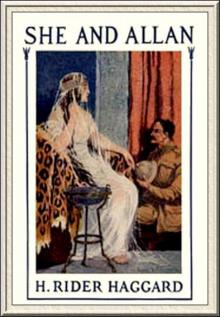 She and Allan
She and Allan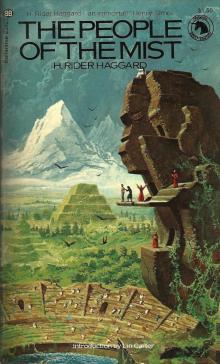 The People of the Mist
The People of the Mist She
She Morning Star
Morning Star King Solomon's Mines
King Solomon's Mines She: A History of Adventure
She: A History of Adventure Cleopatra
Cleopatra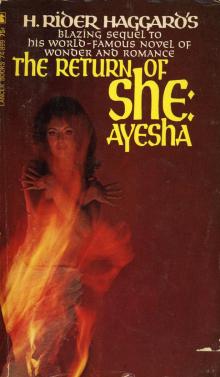 Ayesha, the Return of She
Ayesha, the Return of She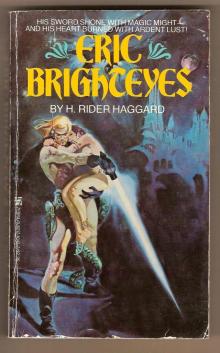 Eric Brighteyes
Eric Brighteyes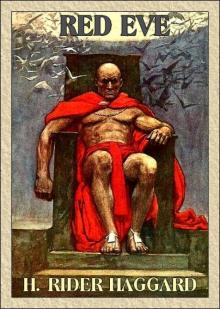 Red Eve
Red Eve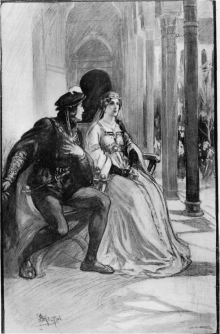 Fair Margaret
Fair Margaret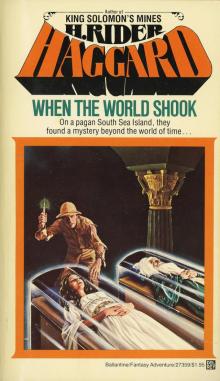 When the World Shook
When the World Shook Lysbeth, a Tale of the Dutch
Lysbeth, a Tale of the Dutch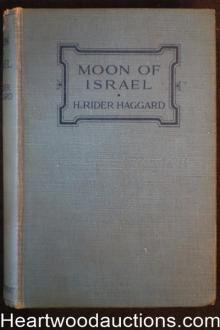 Moon of Israel: A Tale of the Exodus
Moon of Israel: A Tale of the Exodus Long Odds
Long Odds The Ghost Kings
The Ghost Kings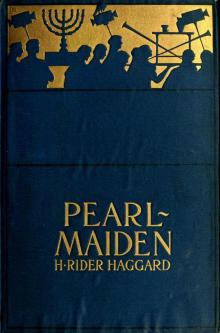 Pearl-Maiden: A Tale of the Fall of Jerusalem
Pearl-Maiden: A Tale of the Fall of Jerusalem Allan and the Holy Flower
Allan and the Holy Flower Smith and the Pharaohs, and other Tales
Smith and the Pharaohs, and other Tales The Wanderer's Necklace
The Wanderer's Necklace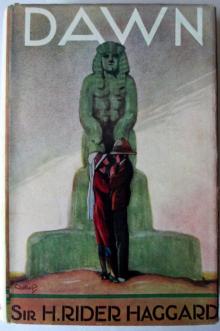 Dawn
Dawn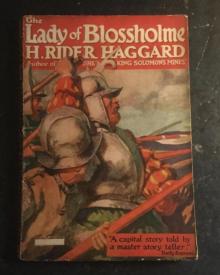 The Lady of Blossholme
The Lady of Blossholme Stella Fregelius: A Tale of Three Destinies
Stella Fregelius: A Tale of Three Destinies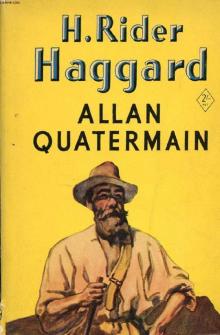 Allan Quatermain
Allan Quatermain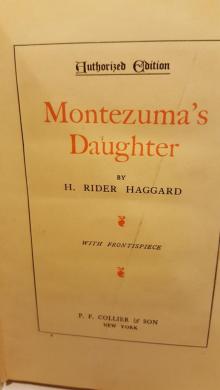 Montezuma's Daughter
Montezuma's Daughter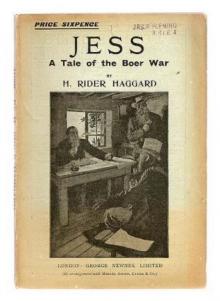 Jess
Jess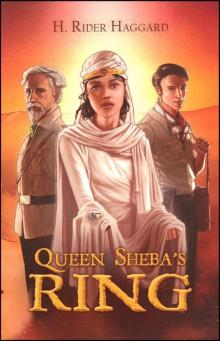 The Brethren
The Brethren Allan's Wife
Allan's Wife Child of Storm
Child of Storm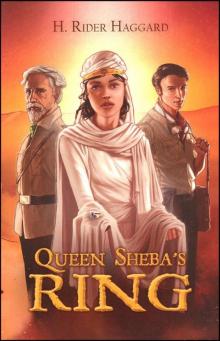 Queen Sheba's Ring
Queen Sheba's Ring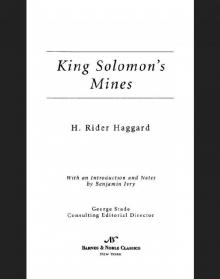 King Solomon's Mines (Barnes & Noble Classics Series)
King Solomon's Mines (Barnes & Noble Classics Series)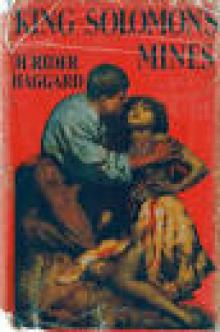 Complete Allan Quatermain Omnibus - Volumes 1 - 10
Complete Allan Quatermain Omnibus - Volumes 1 - 10